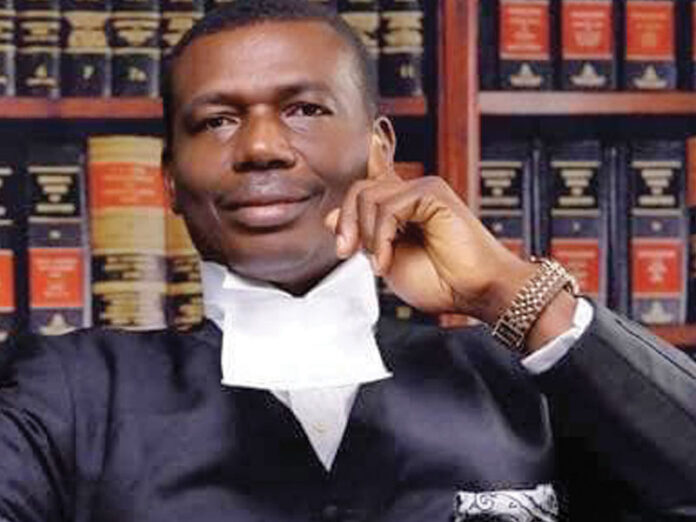By Ebun-Olu Adegboruwa (SAN)
The past one week has been very challenging for judges, lawyers and litigants alike, as the court system became paralyzed all over the nation, due to the ongoing industrial action by the Judiciary Staff Union of Nigeria, (JUSUN), over its demand for financial autonomy for the judiciary.
It has been a very delicate rope for lawyers to navigate through, being a matter of choosing between the devil and the deep blue sea. If lawyers support JUSUN for the strike to continue, they lose revenue and slow down the progress of their cases and if they oppose the strike, then their ‘sufferings’ will continue and the executive arm of government will keep trampling upon the independence of the judiciary. Whichever option they choose, the courts are locked for now, until further notice. So, why are the courts locked?
Though JUSUN had given notice of its proposed strike action since March 13, 2021, nothing was done by the government to address the notice, leading to the closure of the courts from Tuesday, April 6, 2021.
The JUSUN Task Force was all over the courts to enforce the strike by closing all the entrance gates of the Court of Appeal, the Federal High Court, the National Industrial Court, the High Court and indeed the Magistrate’s Courts, in Lagos State.
Reports monitored from other parts of the country indicate successful implementation of the strike action by other State branches of JUSUN. What really is the Grouse of JUSUN?
Financial autonomy for the judiciary, total independence for the third arm of government and commitment by the executive arm to obey the tenets of the Constitution as it concerns the judiciary. This is not rocket science, is it?
Expectedly, there are divided views on the JUSUN strike. While some lawyers feel it is counter-productive, to punish litigants and lawyers for the sins of the executive arm, some others have expressed the view that strike action being a recognized tool in industrial relations, JUSUN is perfectly in order to deploy it as a veritable tool to get the attention of all concerned.
It is noteworthy that virtually all segments of Nigeria are or have been on strike; from doctors to electricity workers, university and polytechnic teachers, the non-academic staff, aides of legislators and even security men. The general view in this regard is that strike is the only language that can arrest the attention of those in power, even though this is very unfortunate.
As it has played out in the JUSUN and other strike actions, government officials, through their utterances and actions, all seem to confirm the potency of strike actions as the only means of bringing government to the negotiation table. What really is the case for financial autonomy for the judiciary?
Section 80 (1) of the Constitution established the Consolidated Revenue Fund for the Federation, from which funds can only be withdrawn either to meet expenditure that is charged upon the fund by the Constitution, or through appropriation. Under and by virtue of Section 81 (3) of the self-same Constitution, the amount standing to the credit of INEC, National Assembly and the Judiciary in the Consolidated Revenue Fund shall be paid directly to the National Judicial Council for disbursement to the heads of courts established for the Federation and the States.
Section 84 (2) specifically states that remuneration, salaries and allowances payable to judicial officers shall be a charge upon the Consolidated Revenue Fund of the Federation. INEC and the National Assembly have pursuant to these foregoing provisions, freed themselves from the stranglehold of the executive, through direct control of their budget estimates, leaving the judiciary behind and under executive captivity, as it were. The struggle has then been to bring the judiciary at par with the other arms of government, resulting in several court actions and judgements, all of which have not been obeyed by the executive arm. This is what has led to the current strike action by JUSUN.
I verily believe that the JUSUN strike action is for the benefit of lawyers, judges, litigants and indeed the legal profession at large, as a way of addressing the real issues, once and for all. However, the other concern of all stakeholders is the dimension and timing of the strike action. With COVID 19 ravaging the effectiveness of justice administration, coupled with the wanton looting of and arson upon the Courts in some parts of the country during the EndSARS protests, strike action in the midst of the Easter holiday, is seen as overkill, especially for the masses, whose hope is the court, as the last bus-stop for redress.
The ready answer to this is that nothing good comes easy, if we compare the pains of childbirth and the joy of delivery, then the appeal would be for all stakeholders to endure the pains in order to enjoy the gains. The other argument is whether JUSUN should compartmentalize the strike between the federal and state judiciaries since the federal government has substantially complied with the main constitutional requirements in respect of financial autonomy for the federal courts. This argument resonates with me, for the reasons stated hereunder.
Like a lone ranger on a mission, the President started a seemingly silent ‘revolution’ to grant autonomy to the legislature and judiciary of the States. It is a commendable development by the Muhammadu Buhari government, coming in the midst of its many challenges. It started with the 4th Alteration to the Constitution of the Federal Republic of Nigeria, which was initiated by the Saraki-led National Assembly.
Buhari signed Bill into Law in 2018
As a way of overcoming this monumental constitutional challenge, a Bill was passed by the National Assembly, granting financial autonomy to the judiciary and the houses of assembly of the States, in 2017. In June 2018, the President assented to the said Bill and it became part of the laws of the Federal Republic of Nigeria. Even after that, the state executives would not budge.
The President then decided to set up a 22-man Committee known as The Presidential Implementation Committee on the Autonomy of State Legislature and Judiciary, with the Honourable Attorney-General of the Federation as the Chairman. The mandate of the Committee was to ensure the full implementation of the 4th Alteration to the Constitution and thus free these important sectors of our democratic experiment, from the stranglehold of the executive arm.
As a follow up to this, the President signed an executive order, to give effect to the 4th Alteration. Many hold the view that it is ultra vires for the last President to seek to tinker with the revenue of the States or dictate how they are to be disbursed.
In view of the clear provisions of Sections 80-84 of the Constitution, I humbly beg to disagree with this view. Even though Executive Order 10 may be superfluous to the extent that the 4th Alteration is already in place, the President is nonetheless empowered to enforce the Constitution as directed under Section 121 (3) thereof.
The judiciary is empowered by the Constitution to entertain and determine disputes between persons and persons, between persons and government and between governments and governments. The conflict margin is more on the executive-judiciary angle because of the obvious and excessive impunity of the executive arm, especially the law enforcement agencies.
The general thinking of most governors is to cage the courts and starve the judiciary of funds, as a means of rendering it ineffective, so that lawlessness can thrive unchallenged or where challenged, unchecked.
Governors uncomfortable with Independent Judiciary
Most governors are therefore not comfortable with a viable and independent judiciary, which they dread as a veritable tool in the hands of the people, to challenge and overturn all manner of excesses.
Through the office of the Attorney-General and Commissioner for Justice of the various States, the executive governors have perfected the style of holding the judiciary captive, starving it of needed funds and infrastructure. So, in most cases, the judiciary is forced to go begging cap in hand, for funding. And assuredly as we all know it, he who pays the piper calls the tune. This was the very ugly scenario before the ‘revolution’ of the 4th Alteration to the Constitution, seeking to free the legislature and the judiciary, from the very firm grip of the executive.
By the bold and innovative provisions of the Financial Autonomy of State Legislatures and State Judiciaries (Fourth Alteration, No.4) Act of 2018, the road was cleared for the funding of the Houses of Assembly and Judiciary of the States, directly from the Consolidated Revenue Fund of the States.
The Act then amended the existing Section 121 (3) of the Constitution by stating that “any amount standing to the credit of the House of Assembly of the State and the Judiciary, in the Consolidated Revenue Fund of the State shall be paid directly to the said bodies respectively; in the case of the judiciary, such amount shall be paid directly to the heads of the courts concerned.”
In order to actualize the letters of the 4th Alteration, the President thereafter issued Executive Order 10, authorizing the Accountant General of the Federation to make direct transfers from the Consolidated Revenue Fund, to the bank account of the judiciary of the States. Some States like Bayelsa and Delta have since passed their own municipal legislations, granting financial autonomy to the judiciary.
The executive order signed by the President is critical because it goes to the very root of the many problems associated with justice administration and the seeming docility and ineffectiveness of state legislatures. No matter the quantum of the amount of money released, the judiciary should have the power to determine its budget and spending, to prioritize its commitment level, all targeted at delivering justice to the people.
Appeal to Governors
The appeal then is to the Governors of the States, to work together with JUSUN, NBA and the federal government to empower the judiciary financially, once and for all. This should be the focus of the various meetings being convened to resolve this imbroglio.
It is my belief however that judicial independence cannot be measured by funding alone, but also in the willingness to obey and abide by all decisions and orders of the courts. The integrity of the judiciary is better achieved through willful obedience to the orders and directives of the courts.
In this regard, so long as judges are living under some mortal trepidation of persecution on account of their decisions, as long as we still require persuasion to get the executive to obey court orders, then the judiciary cannot be said to be independent, no matter the amount of billions of naira thrown at the courts.
My charge to the President is to extend the executive order to include compulsory obedience to all lawful orders issued by the courts and to prohibit any form of harassment or intimidation of judicial officers, however subtly it may come. When this is achieved, then we can truly say that the judiciary is autonomous and independent.
Ebun-Olu Adegboruwa, (SAN) is a Lagos based lawyer and a member of the Lagos judicial panel of inquiry over alleged Lekki tollgate shootings during #EndSARS protests.













